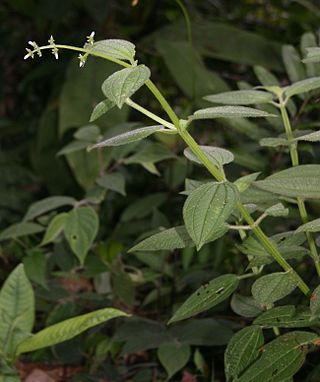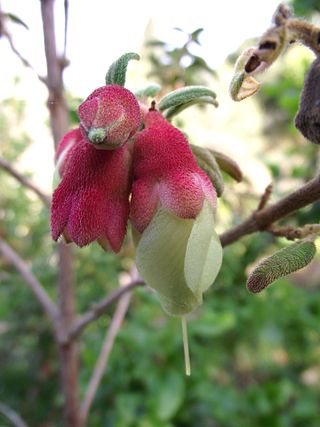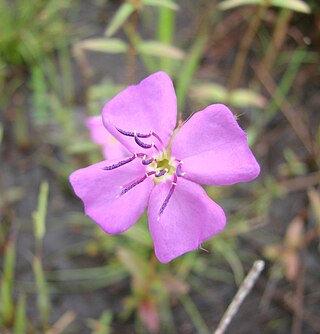
Melastomataceae is a family of dicotyledonous flowering plants found mostly in the tropics comprising c. 175 genera and c. 5115 known species. Melastomes are annual or perennial herbs, shrubs, or small trees.

Tibouchina is a neotropical flowering plant genus in the family Melastomataceae. Species of this genus are subshrubs, shrubs or small trees and typically have purple flowers. They are native to Mexico, the Caribbean, and South America where they are found as far south as northern Argentina. Members of this genus are known as glory bushes, glory trees or princess flowers. The name Tibouchina is adapted from a Guianan indigenous name for a member of this genus. A systematic study in 2013 showed that as then circumscribed the genus was paraphyletic, and in 2019 the genus was split into a more narrowly circumscribed Tibouchina, two re-established genera Pleroma and Chaetogastra, and a new genus, Andesanthus.

Aciotis is a genus of flowering plants in the family Melastomataceae. There are about 13 species distributed from Mexico to Brazil.

Blakea is a genus of flowering plants in the family Melastomataceae. There are about 189 species distributed from Mexico to Bolivia and the Antilles. They are climbers, shrubs, and trees, some epiphytic.

Brachyotum is a genus of flowering plants in the family Melastomataceae. There are about 58 species native to the Andes of South America.

Henriettea is a genus of flowering plants in the family Melastomataceae, with some 399 species accepted. It is distributed in the Americas. Some species in the genus are known commonly as camasey., though the common name camasey may also refer to plants of genus Miconia.

Meriania is a genus of flowering plants in the family Melastomataceae. There are about 93 species distributed from Mexico to Brazil and the Antilles.

Triolena is a genus of flowering plants in the family Melastomataceae. They are found in southern Mexico southward to Bolivia. As of 1991 there were 20 to 25 species.

Pterolepis is a genus of flowering plant in the family Melastomataceae. Within Melastomataceae, it forms a clade with genus Pterogastra. Pterolepis contains some fifteen species, all of which are found in the Neotropical geographic realmm. Most species are concentrated in Brazil, with a few others across Central and South America.

Microlicia is a genus of flowering plants in the family Melastomataceae, native to northern South America, particularly Brazil. They tend to be subshrubs.

Acisanthera is a genus of flowering plants in the family Melastomataceae. It contains 11 species and is found in South America, Central America, and the Caribbean. It was described by Patrick Browne in 1756.

Bellucia is a genus of plants in the family Melastomataceae.

Chaetogastra is a genus of flowering plants belonging to the family Melastomataceae. Its native range is South America and North America. It contains around 115 species.
Comolia is a genus of flowering plants belonging to the family Melastomataceae.
Siphanthera is a genus of flowering plants belonging to the family Melastomataceae.

Salpinga is a genus of flowering plants belonging to the family Melastomataceae.
Rhynchanthera is a genus of flowering plants belonging to the family Melastomataceae.
Ernestia is a genus of plant in family Melastomataceae.

Pleroma is a genus of flowering plant in the family Melastomataceae, native from Puerto Rico and the Leeward Islands to tropical South America.
















